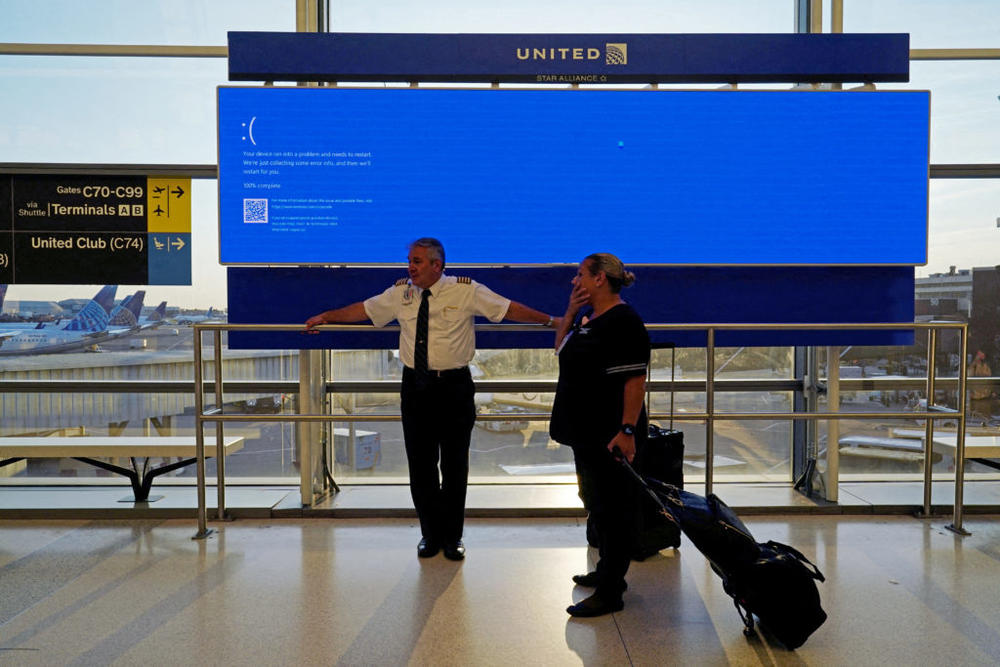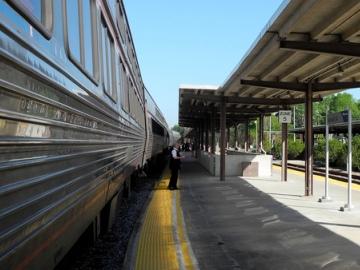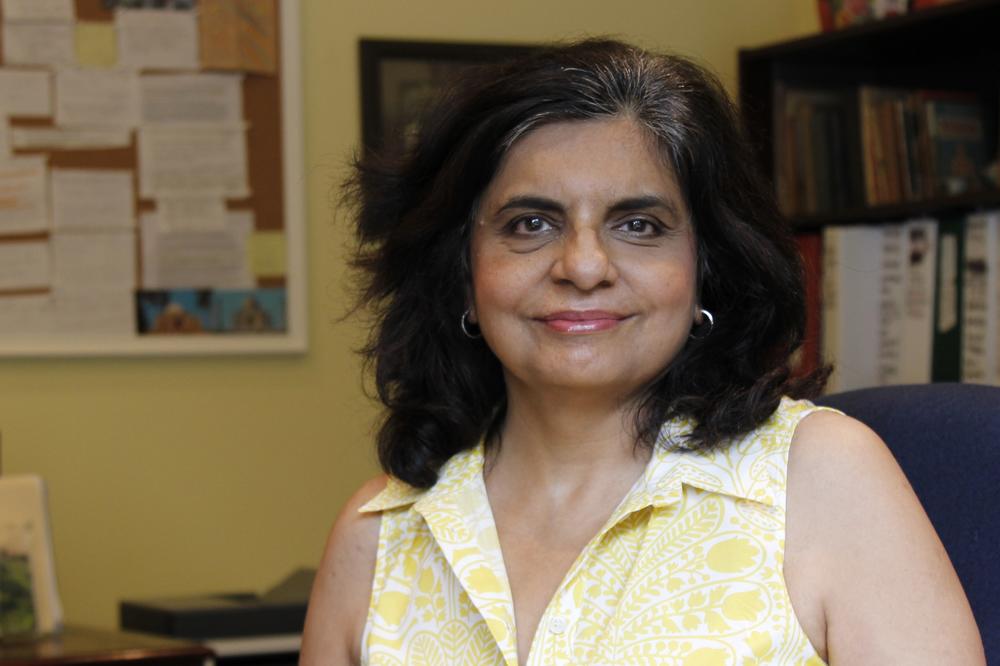
Section Branding
Header Content
Georgia Today: Pres. candidates will appear in GA; UGA student protesters face disciplinary panel
Primary Content
LISTEN: On the Tuesday, July 30 edition of Georgia Today: Both presidential candidates will make appearances in Georgia this week; a disciplinary hearing against six UGA students suspended for their roles in an on-campus protest began today; and the Atlanta Falcons have reached a milestone for the first time in nearly two decades.

Orlando Montoya: Hello and welcome to the Georgia Today podcast from GPB News. Today is Tuesday, July 30. I'm Orlando Montoya. On today's episode, both presidential candidates will make appearances in Georgia this week, a disciplinary hearing against six UGA students suspended for their roles in an on campus protest began today, and the Atlanta Falcons have reached a milestone for the first time in nearly two decades. These stories and more coming up on this edition of Georgia Today.
Story 1:
Orlando Montoya: Both Republican and Democratic presumptive presidential nominees are set to appear in Georgia this week. Former President Donald Trump's campaign said today that he and vice presidential running mate JD Vance will hold a rally in Atlanta on Saturday. Vice President Kamala Harris is set to appear in Atlanta later today. Atlanta-based political strategist Fred Hicks says although Harris puts Georgia more in reach for Democrats, one of her biggest liabilities is how to engage low-propensity Democratic voters.
Fred Hicks: The question hasn't really been whether or not likely Democratic voters are going to vote for Donald Trump, is whether or not they're going to vote at all. And that's why today's rally is so important, because she's trying to bring that energy that we're seeing nationally to Georgia to get those people who voted in 2020, who haven't voted since, to get them excited and get them back out to vote.
Orlando Montoya: Both Harris and Trump rallies will take place at the same location: Georgia State University's Convocation Center.

Story 2:
Orlando Montoya: Multiple news outlets are reporting a possible lawsuit by Delta Air Lines against cybersecurity firm CrowdStrike. CNBC was the first to report last night that Atlanta-based airline has hired famed attorney David Boies to pursue potential damages against CrowdStrike and Microsoft. The airline was hobbled for days and canceled thousands of flights after a faulty software update caused havoc worldwide. CNBC reported potential losses of $350 million to $500 million.
Story 3:
Orlando Montoya: A University of Georgia disciplinary hearing against six students, suspended for their roles in an on-campus protest against the war in Gaza, began today. University officials argued campus police officers identified the April 29 demonstration as a clear danger to the UGA community. The students defended their actions by pointing to campus protests during the civil rights era and the Vietnam War as precedents. Third-year student Ezra Lewis, charged with trespassing on the campus, says the suspension has upended her college career.
Ezra Lewis: Because of being placed under interim suspension, I lost my housing. I lost my employment as an RA. I have also lost a great sense of trust in the university's processes.
Orlando Montoya: University police arrested 16 people at the protest, one of many that took place on campuses around the nation earlier this year. It was unclear if a decision on the suspensions would be made today.
Story 4:
Orlando Montoya: The National Hurricane Center says a large tropical wave in the Atlantic Ocean has a 60% chance of developing into a tropical depression, storm or hurricane over the next seven days. GPB's Benjamin Payne reports.
Benjamin Payne: The wave is currently about 2,000 miles away from the coast of Georgia, so it poses no immediate threat. However, it's the first tropical disturbance this year in which federal forecasters have included the state in its possible trajectory. John Cangialosi is a forecaster at the National Hurricane Center. He says that as the system moves closer to the Bahamas:
John Cangialosi: We think that the environment will get a little bit more conducive for development where the moisture increases, the waters actually are warmer there and wind shear should be generally low, so it'll have a shot to develop into a tropical depression later in the week. Toward the end of the week, or maybe over the weekend.
Benjamin Payne: If the wave does form into a tropical depression, storm or hurricane, it would be the fourth cyclone of the year and be given the name Debby. For GPB News, I'm Benjamin Payne in Savannah.
Story 5:
Orlando Montoya: Attorneys for the family of a 14-year-old killed by a collapsing wall at a swimming pool on Robins Air Force Base plan to sue whoever is responsible. Gabriel Stone was killed on July 22 when a cinderblock wall in the pool locker room fell on him and three other boys. Attorney Roderick Edmond represents the family. He says officials at Robins Air Force Base have been cooperative as his team begins their investigation. But he fears similarly dangerous infrastructure could crumble at other military installations.
Roderick Edmond: Are there other hazards like this existing out there amongst military installations throughout the United States? If so, this is an opportunity to go in, investigate and fix that so that no other family ever has to undergo and experience the grief and anguish that this family is feeling right now.
Orlando Montoya: Edmond plans on seeking monetary damages in federal court pending Stone's full autopsy report.

Story 6:
Orlando Montoya: The U.S. Justice Department is accusing a freight rail operator of illegally delaying passenger trains on an Amtrak route that stops in Atlanta, Gainesville and Toccoa. The agency today filed a complaint against Atlanta-based Norfolk Southern, saying the company violated federal law by causing routine delays on the New York to New Orleans route, the Crescent. A Norfolk Southern spokesman said the railroad is committed to complying with federal law that prioritizes passenger trains over freight trains.
Story 7:
Orlando Montoya: Atlanta Falcons have sold out season tickets for the first time in nearly two decades. It's a sign the NFL franchise is generating some excitement heading into their 2024 season. Falcons made some significant moves in the offseason, including hiring a new head coach and signing a new quarterback.
Story 8:
Orlando Montoya: Georgia Ports Authority moved a record number of automobiles across its docks in the fiscal year that ended in June, bringing it neck-and-neck with the nation's top auto port. The agency said today that 830,000 auto imports and exports moved through the Port of Brunswick in the 2024 fiscal year. That's just shy of the 847,000 autos handled by the Port of Baltimore.

Story 9:
Orlando Montoya: In Atlanta author Parul Kapur's debut novel, Inside the Mirror, twin sisters in 1950s Bombay, pursued their artistic ambitions against the wishes of their father and a society bent on prescribing their paths through life. As one sister pursues painting, the other strives to become a dancer. Both sisters use their art to process how their family and their country changes as British control of the country ends. GPB's Peter Biello visited Kapur in her writing studio to talk about her book.
Peter Biello: Let's start first by talking a little bit about the context for the story and the history that was happening at the time. This is post partition India so early 1950s. And your main characters, the twins, they're living in Bombay. Can you describe the state of the country at that time?
Parul Kapur: What happened in 1947 when the British left was they partitioned India into — It became India, West Pakistan and East Pakistan. And that partition, literally as they were leaving, created absolute catastrophe in the nation. Nobody actually anticipated that it would be as violent as it was. About 2 to 3 million people were killed just on the western border of India, which is West Pakistan. And that's actually the region that affected my father's family. And so the twin sisters, while their family is not directly impacted by this partition (they're not refugees because they living in the city of Bombay, which was relatively unaffected because of its geographical location). But some of their relatives who were affected in the Punjab and some who were living in Karachi, they came and took refuge with these sisters because people had no homes ... like my father's family, taking refuge with whatever relative you had in whatever city. And really, it's a big wound for them. Even when you're a witness to tragedy, it is a wound for you also. And so through that wound, in a sense, is how their art is born.
Peter Biello: When we meet these two sisters, Jaya and Kamlesh, they're 19-ish, about — about 19. And Jaya and Kamlesh, they both are assigned careers from their father, who's progressive at the time, and he's saying, yes, education for them. Here's what you should do. And prescribing for Jaya a medical career for Kamlesh, a school — a job as a teacher. But they both have artistic ambitions. Jaya wants to paint. Kamlesh wants to dance and perform. And therein lies the central tension for them. Can you describe who they are and how you came to figure out who they are?
Parul Kapur: Yeah. So figuring out who they are was a process of really of understanding their time and their culture. So, as I say, they had these refugee relatives living with them for some for weeks, some for months. They were hearing these stories and they were young girls. So they were old enough to understand, but not, old enough to really emotionally process everything. And so Jaya starts drawing these horrible incidents that she's hearing about, you know, women relatives weeping in their apartment. And she starts drawing the stories that she's hearing. Her sister Kamlesh has a different impulse, which is, they find out about dance classes in the neighborhood and she starts taking dance. So these are all the arts also become part of their way of processing this emotional grief. Now, when they get older, this comes into big conflict with their family and society. Because a woman, you know, like you said, the father has chosen their professions for them, and he's progressive in that way. But you, a woman, could not be an artist because that requires a level of freedom and ability to voice yourself. That is a social disgrace. And social disgrace in India is a very serious thing. It's like if you bring shame on your family, it's almost as if they lose so much standing in society that they lose their ability to survive. Your reputation is part of your value and your power in the society, and your ability to thrive and survive in it.
Parul Kapur: Yes. So figuring out who they are was a process of really of understanding their time and their culture. So, as I say, they had these refugee relatives living with them for — some for weeks, some for months. They were hearing these stories and they were young girls. So they were old enough to understand, but not old enough to really emotionally process everything. And so Jaya starts drawing these horrible incidents that she's hearing about: women relatives weeping in their apartment, and she starts drawing the stories that she's hearing. Her sister Kamlesh has a different impulse, which is, they find out about dance classes in the neighborhood and she starts taking dance. ... So the arts also become part of their way of processing this emotional grief. Now, when they get older, this comes into big conflict with their family and society because a woman ... the father has chosen their professions for them, and he's progressive in that way, but a woman could not be an artist because that requires a level of freedom and ability to voice yourself. That is a social disgrace. And social disgrace in India is a very serious thing. It's like if you bring shame on your family, it's almost as if they lose so much standing in society that they lose their ability to survive. Your reputation is part of your value and your power in this society, and your ability to thrive and survive in it.
Orlando Montoya: That's Parul Kapur speaking with GPB's Peter Biello about her debut novel Inside the Mirror. The book is also the subject of the latest Narrative Edge podcast, a podcast about books with Georgia connections hosted by me and Peter. You can find Narrative Edge wherever you get your podcasts or at GPB.org/NarrativeEdge.
Orlando Montoya: And that's it for today's edition of Georgia Today. I'd like to thank you for joining me today, and also thank you for subscribing to this podcast. If you haven't hit subscribe yet, do that right now helps you to keep us current in your feed. Also, if you have feedback for us, send that to GeorgiaToday@GPB.org. And as always, our website is constantly updated with news from across Georgia. Visit GPB.org/news. I'm Orlando Montoya. Thanks for tuning in.
---
For more on these stories and more, go to GPB.org/news



